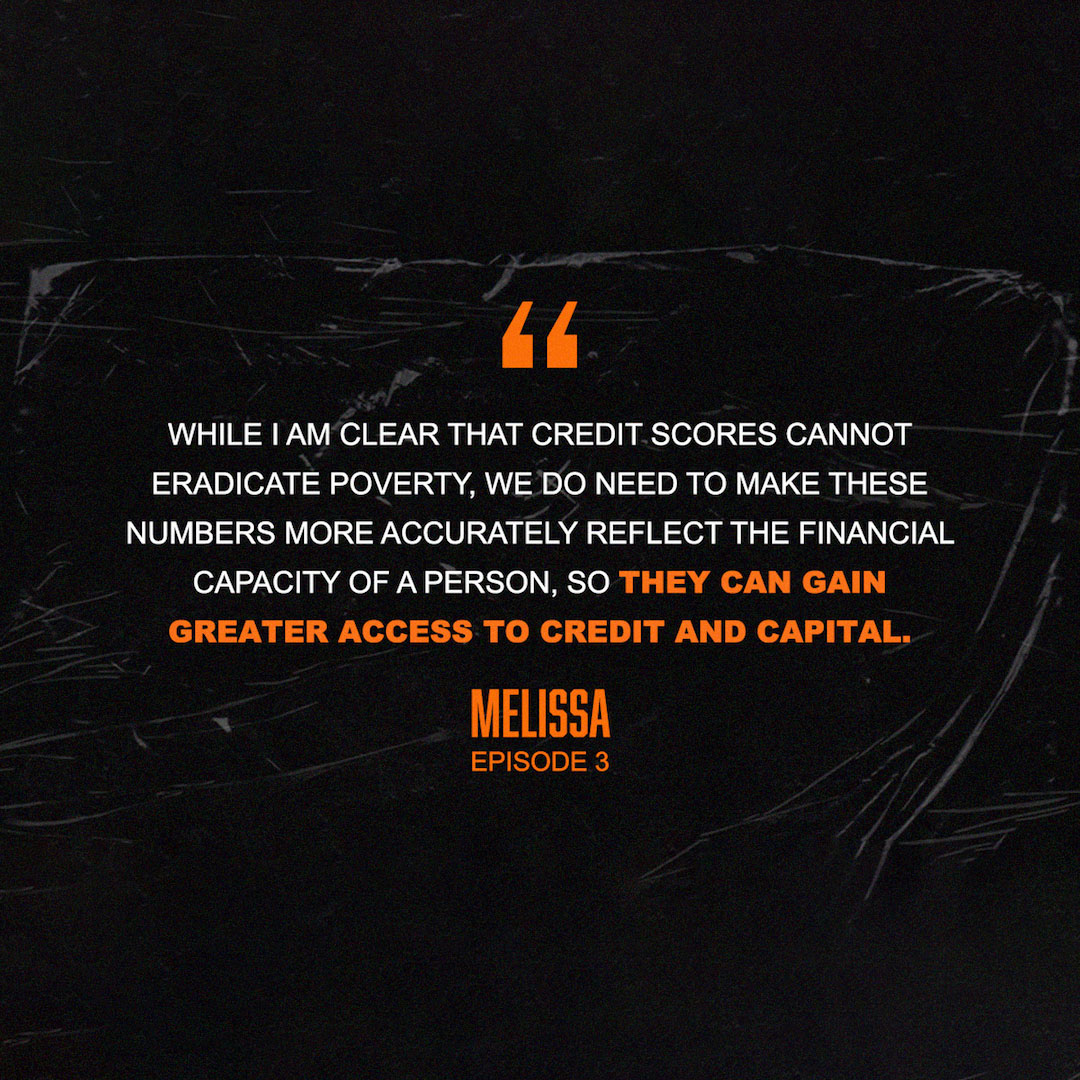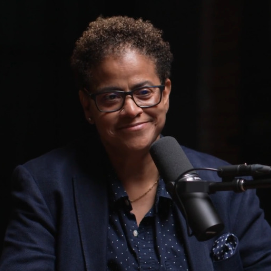In today’s episode of The Deep Cut Melissa is diving into a topic that most of us try to avoid at all costs…credit scores.
Learn More About Credit Scores:
- Credit Education Videos (myFico)
Transcript:
It’s time for The Deep Cut from Founder Hustle, the podcast series by, for and about the new majority entrepreneur. I am your host, Melissa Bradley, founder of 1863 Ventures. As a seasoned venture capitalist, I provide practical advice and tools to entrepreneurs and their ecosystems on how to grow and scale their businesses. But I also realize that you cannot be successful without knowing what has come before, as well as preparing for what is yet to come. And that’s where The Deep Cut comes in. Considering that over 50% of small businesses fail within five years, these bonus episodes are where we level up on the history that brought us to this moment and the current events that can impact the stability and growth of your business and shape your future. The Deep Cut is a power up from Founder Hustle to help you on the journey from founder to CEO.
In Episode 105 with MBallou Conde-Kouyate of M&T Bank, we had a great conversation about financial strategies to help entrepreneurs. During our discussion, we talked about credit scores. Yes, that number that can change your mood in a second and make someone really happy or very upset. Because of the emotional tie to our credit scores, I wanted to share some background on how they came into being and some ideas I have on how to make us all a bit more credit worthy.
In case you didn’t know, I have had the privilege to serve in two presidential administrations, under presidents, Clinton and Obama. Under Clinton, I served as a financial regulator at the Department of Treasury. Well, in this role, I spent a lot of time thinking about credit scores. Credit scores and the policy surrounding them are very important to me. While I am clear that credit scores cannot eradicate poverty, we do need to make these numbers more accurately reflect the financial capacity of a person, so they can gain greater access to credit and capital. So let’s talk credit scores.
Your credit score is a number that represents the risk a lender takes when you borrow money. A FICO score is a well-known measure created by the Fair Isaac Corporation and used by credit agencies to indicate a borrower’s risk. In both cases, the higher the credit score, the perceived lower the risk to the lender. Having joined the Office of Thrift Supervision, after the savings and loans crisis in 1995, it was clear, wealthy people were over-leveraged. I saw at first-hand that low-income folks are not a threat to our financial systems, but wealthy people are. Credit reporting is fewer than 200-years-old, it was invented as part of America’s transition to a capitalist movement. Its history has proved both alarming and empowering, helping millions to realize the American dream through access to credit while causing irreparable harm for others, that is hard to change and shake. Credit scores have saddled the majority of Americans with a lifelong “financial identity”. This is an unerasable mark that has an outsized impact on one’s financial future.
The biggest experiment of credit scores took place in 1841 with the creation of the mercantile agency. Merchants who were burned by the 1837 depression panicked due to the over extension of credit. They set out to systematize the rumors regarding debtors character and assets. These early financial reports were incredibly subjective. They were filled with the opinions of predominantly white male reporters and provided clear evidence of the racial, class and gender biases. The subjectivity of these reports had two important consequences. First it reinforced existing social hierarchies, serving as an early form of what we now call red lining. Second, the jumble of rumors contained in early reports proved difficult to translate into actionable lessons. This dilemma continues.
Credit scores are often one of the biggest challenges faced by entrepreneurs as they seek capital to support the scaling and sustaining of their businesses. Modifying existing credit score and guidelines can expand access to capital and create opportunities for entrepreneurs who are overlooked by the current system.
With limited access to friends and family funding, coupled with the higher cost of being Black, too often our expenses outweigh income personally and professionally. This causes cash flow issues which lead to lower credit scores. However we do know that folks pay their bills on time, such as cell phones, food, car insurance and the like, the prioritization is based on necessity and not always availability. Therefore, effort should be taken into account to consider alternative inputs that are actually more relevant to the daily survival of our communities to determine credit worthiness. The Consumer Financial Protection Bureau found that only 54% of all adults in the United States have super prime or prime credit scores. Those are the best. This leaves a significant portion with less than ideal credit scores, and 22% have thin credit or no credit at all. Alternative credit scoring gives borrowers without a strong past of credit a chance. A chance to receive a loan by basing their score on different criteria.
For example, to determine a borrower’s alternative credit score, a lender could evaluate data such as rent, utility, cable or cell phone payments, and determine, does the borrower pay them on time and in full. They can look at checking account data and determine, does a borrower have sound financial backing. They could look at shopping history and see if a borrower makes unnecessary or frivolous purchases without the financial means to back them up. They can look at property records, which tells if a borrower has invested in their own property. In addition to these factors, some alternative credit scoring models will also take a deeper look into a borrower’s education, occupation and even social media presence. With all of this information, lenders have access to a comprehensive profile of a potential borrower and can determine their risk level based on more information than just the traditional credit score.
You may wonder why this is important to you as an entrepreneur and business owner? Well, let me tell you, your credit score is often a key determinant if someone will invest in you or not. Banks definitely use credit scores to determine if they should give you a loan. Many venture capitalists also investigate your credit score and use it as a proxy for how well you manage money. Therefore they use that credit score to determine how well you will lead the company and pay back their investment.
So, to all my founders, take note of your credit scores. In 2012, a rule was created that allowed the CFPB to supervise consumer reporting agencies. The three largest credit reporting companies issue more than three billion consumer reports a year and maintain files in more than 200 million Americans. The division within CFPB seeks to create alternative credit scoring approaches to be implemented by the three major credit bureaus so they can reduce unnecessary barriers to capital, particularly for new majority entrepreneurs. The agencies would include non-traditional sources of data like rental history, utility bills, and the like in their scoring criteria.
Now, I think if CFPB is charged with instituting alternative credit scoring process, these are things they should include; driver’s license and driving records, employment and income, real estate ownership and leans, bank accounts and bankruptcies, utility payment records, which include electricity, gas, water, mobile phone and rental records, looking at location, length of lease and payment history.
A pilot study amongst ride-hailing service providers was conducted to create an alternative credit scoring model for drivers based on their behaviors, their ratings and the comments customer leave. The new methodology was integrated into a scoring system and was able to show that in the alternative model, the Uber drivers had lower default rates than anyone else in the current portfolio.
Why do I share about Uber drivers? Because like entrepreneurs, they have unstable access to regular paychecks and often have cash flow issues or are over-extended on credit as they wait for more money to arrive. Alternative scores, inclusive employment, consistent or increasing income, address ability and reliable payment history verified through alternative credit assessment models can provide opportunities to grow access to credit to historically marginalized communities.
After all, the ability to show the stability of a founder to an investor is paramount.
Thank you for listening.
Thank you for listening. Don’t forget to subscribe to the Founder Hustle Podcast where you can hear thought provoking interviews along with our Deep Cuts.
Check us out at founderhustle.io.
You can find us on Twitter at @FounderHustle.
On Instagram we’re @_founderhustle.
And if you’re a Facebook person we’re also there as Founder Hustle.
Founder Hustle and the Deep Cut are produced by Kinetic Energy Entertainment.
Edited and mixed by Anne Kane.
Social media producer is Misako Envela.
Music is Ratata by Curtis Cole.
And remember, knowledge is crucial, because knowledge is power.
Referenced in Today’s Episode:
- The Mercantile Agency: A Curious Relationship of Credit Reporting and Abolitionism (Amistad Research Center)
Credits:
- Founder Hustle and the Deep Cut are produced by Kinetic Energy Entertainment
- Edited and mixed by Ann Kane.
- Social media producer is Misako Envela
- Music is Ratata by Curtis Cole



